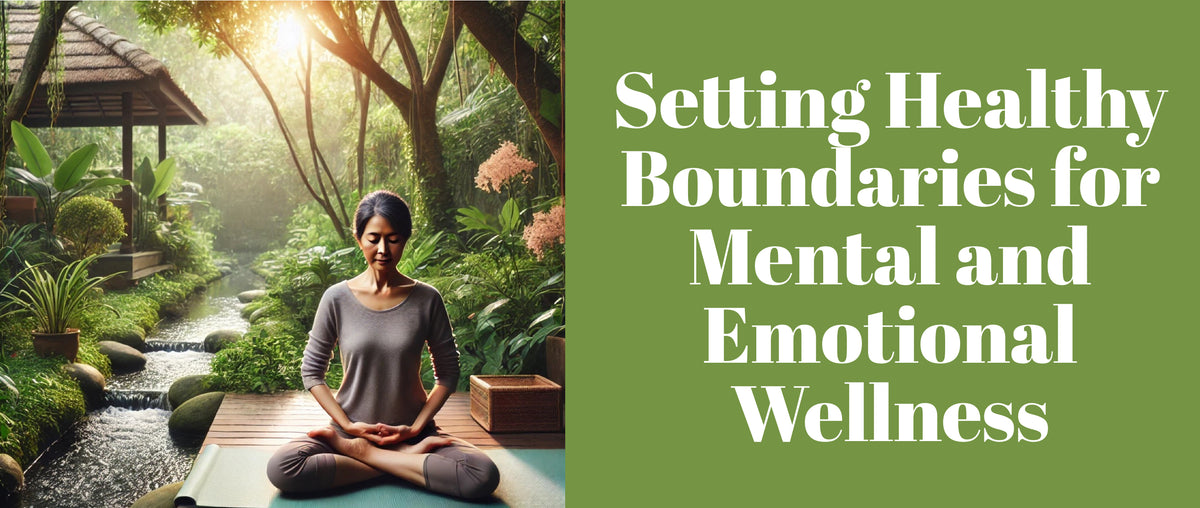Setting Healthy Boundaries for Mental and Emotional Wellness
In today's fast-paced society, mental and emotional wellness often get overshadowed by everyday demands. One of the most essential yet frequently overlooked ways to preserve mental health is by setting healthy boundaries. Boundaries help create a mental and emotional safety zone, allowing us to balance our energy, manage stress, and improve the quality of our relationships.
But boundary-setting is more than simply saying no. It’s about understanding your limits and needs, communicating them effectively, and maintaining a sense of control over your well-being. In this article, we’ll dive into how to set boundaries and their role in boosting your mental health.
Why Boundaries Matter for Mental Wellness
Boundaries are fundamental for protecting your mental health. Just like how you might choose a healthy meal to nourish your body, setting boundaries ensures that your mind is not overwhelmed by external demands. Whether at work, in relationships, or in daily routines, boundaries allow you to manage your energy and emotional bandwidth.
The Importance of Boundaries
Healthy boundaries are like a protective layer that keeps our emotional and mental health intact. Without boundaries, we may overextend ourselves and face burnout or emotional exhaustion.
- Stress Reduction: Clear boundaries help you avoid overcommitment, ensuring you have time for self-care and relaxation. This is similar to choosing the right foods for your physical health, like opting for fat free butter or Vegan products to maintain a balanced diet.
- Self-Esteem Boost: When you set and maintain boundaries, you’re sending a message to yourself and others that your needs are important.
- Healthy Relationships: Boundaries prevent resentment and ensure mutual respect in relationships, much like how choosing plant based cheese supports a healthy lifestyle choice.
Just like selecting the best mozzarella cheese for pizza makes a difference in your meal’s quality, setting boundaries enhances the quality of your mental well-being.

The Connection Between Boundaries and Emotional Health
Boundaries don’t just protect your time and space; they safeguard your emotional health. When boundaries are not in place, people often feel emotionally drained and overwhelmed by the demands of others. This can lead to frustration, resentment, and mental fatigue.
Why Emotional Boundaries Are Essential
Emotional boundaries protect your feelings and prevent others from draining your emotional energy. They ensure you don’t take on more than you can handle emotionally, similar to how making healthy choices like incorporating Vegan Cheese into your diet can prevent long-term physical fatigue.
Examples of Emotional Boundaries:
- At Work: Politely refusing to work late when it interferes with personal time.
- In Relationships: Setting limits on how much emotional labor you’re willing to take on from friends or partners.
- Personal Boundaries: Deciding that you won’t engage in negative self-talk or allow others to belittle your feelings.
Just like when you choose to buy mozzarella cheese online from a trusted source for guaranteed quality, emotional boundaries allow you to filter what’s beneficial for your well-being.
Types of Boundaries
There are several types of boundaries that contribute to a healthy and balanced life. Each type plays a unique role in maintaining both mental and emotional health.
Emotional Boundaries
These protect your feelings and emotional energy. If someone is constantly offloading their problems onto you, it's crucial to communicate that you have emotional limits too.
Physical Boundaries
Physical boundaries relate to personal space and physical touch. Setting limits on when, how, and where physical contact occurs is essential for physical and mental comfort.
Time Boundaries
Time boundaries help you manage your schedule and prevent burnout. This can mean learning to say no to extra projects at work or ensuring you have enough time to relax after a busy day. Think of it like taking time to savor a dish made with Garlic Butter—it’s about enjoying life at your own pace.
Mental Boundaries
Mental boundaries protect your mind from negative influences or conversations. For instance, refusing to engage in arguments that are emotionally draining helps maintain peace of mind.
Material Boundaries
Material boundaries involve respecting personal belongings. For example, you might set a limit on how much money you're willing to lend a friend. Similarly, when choosing food products, opting for quality items like parmesan cheese or Unsalted Butter ensures you're respecting your own dietary needs.
| Type of Boundary | Definition | Example |
|---|---|---|
| Emotional | Protects emotional energy | Saying no to emotionally draining conversations |
| Physical | Limits on physical space and touch | Asking for personal space when uncomfortable |
| Time | Protects personal time | Refusing additional work projects to preserve work-life balance |
| Mental | Protects thoughts from negativity | Avoiding heated political debates with colleagues |
| Material | Protects personal possessions | Setting limits on lending out money or valuable items |
Signs You Need to Set Boundaries
How do you know when you need boundaries? It’s essential to recognize the signs that you’re stretching yourself too thin.
Common Signs:
- Feeling Overwhelmed: You often feel anxious or stressed by others’ demands.
- Emotional Exhaustion: Social interactions leave you feeling drained instead of fulfilled.
- Resentment: You frequently feel annoyed or resentful when others ask for favors.
- Difficulty Saying No: You find it challenging to turn down requests, even when they’re inconvenient.
Think of boundaries like the choice between Unprocessed Cheese versus highly processed options. While processed choices may seem convenient in the short term, unprocessed options like plant based cheese are better for your health in the long run. Setting boundaries may feel uncomfortable initially, but it’s essential for your long-term emotional well-being.
Also Read
Steps to Establish Healthy Boundaries
Establishing boundaries requires thought and practice. Start small, and as you grow more confident, you can tackle more challenging situations.
Step 1: Self-Awareness
Before setting boundaries, it’s important to recognize your own limits. Ask yourself: What makes me feel drained or overwhelmed? What do I need more of in my life? This self-awareness is akin to selecting the best ingredients for a meal, such as choosing a mozzarella cheese block for an authentic pizza night.
Step 2: Clear Communication
Be direct and clear when communicating your boundaries. It’s essential to state what you need without being vague. For example, if someone is constantly calling you after work hours, you could say, I’m not available for calls after 7 PM. This level of clarity helps avoid misunderstandings.
Step 3: Start Small
Begin by setting minor boundaries in non-confrontational situations. Over time, this practice will build your confidence. This is similar to transitioning to vegan butter—you start by incorporating small changes into your meals and then gradually adopt a full plant based diet.
Step 4: Be Consistent
Consistency is key. Once you’ve established a boundary, it’s important to maintain it. This consistency helps others respect your limits over time. Just as sticking to a balanced diet of fat-free cheese and healthy options improves your physical health, maintaining boundaries ensures your emotional well-being remains strong.
Step 5: Prepare for Pushback
Not everyone will appreciate your boundaries immediately. Be prepared for some resistance, but don’t let it deter you. Stand firm in your decisions, much like how choosing to cook with unsalted butter over regular options might meet resistance from family, but you know it’s better for long-term health.
Maintaining Boundaries in Different Relationships
Setting boundaries is one thing, but maintaining them is an ongoing process. Different relationships may require different types of boundaries.
Family Relationships
Family dynamics can be complex, but boundaries are essential for maintaining healthy relationships. For example, if a family member is overly critical, it’s okay to say, I would appreciate it if you didn’t comment on my choices.
Work Relationships
At work, boundaries ensure you don’t overextend yourself. Politely declining additional work when you’re already overwhelmed is essential. For example, you could say, I’d love to help with this, but I’m at capacity right now.
Romantic Relationships
Boundaries in romantic relationships ensure both partners feel respected and valued. This could be as simple as establishing alone time when needed. Just as in cooking, choosing quality ingredients like mozzarella cheese online enhances the outcome, setting clear boundaries enhances the relationship’s quality.

The Benefits of Setting Boundaries for Mental and Emotional Wellness
The long-term benefits of setting and maintaining boundaries are immense. They provide you with the emotional tools to handle stress, maintain healthy relationships, and improve your overall quality of life.
Major Benefits:
- Improved Mental Health: Boundaries prevent emotional burnout.
- Better Self-Care: Time to focus on activities that nurture your soul, like making a special dish with garlic butter or experimenting with vegan cheese recipes.
- Healthier Relationships: Relationships where boundaries are respected are more balanced and fulfilling.
By setting boundaries, you’re taking an active step toward mental wellness, just as choosing to cook with fat free butter or parmesan cheese can support a healthier diet. Boundaries are about finding balance and fostering respect for yourself and others.
Conclusion: Prioritizing Mental Wellness with Boundaries
Setting and maintaining boundaries is an essential part of self
In our fast-paced, high-demand world, protecting our mental and emotional wellness is crucial. One effective way to maintain this protection is by setting healthy boundaries. Boundaries allow us to create a safe space, preserve energy, and reduce emotional fatigue, ultimately leading to a more balanced life.
Boundaries aren’t just about saying no but are essential for creating a structure where you can thrive without feeling overwhelmed. Just as maintaining a healthy diet requires choosing quality ingredients like vegan cheese or fat-free butter, boundary-setting is about making thoughtful decisions to protect your well-being.
Do you enjoy vegan food? We have a list of vegan restaurants in India to help you find delicious options in your area!










